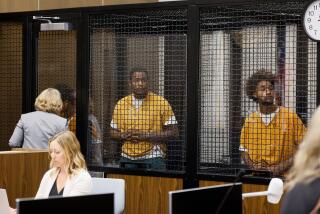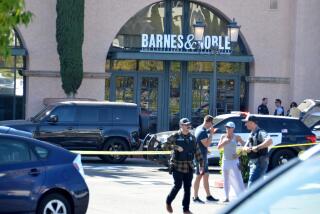Jeffrey MacDonald back in court in ‘70s ‘Fatal Vision’ murder case
WILMINGTON, N.C. -- Jeffrey MacDonald, a Green beret doctor convicted of the 1970 murders of his pregnant wife and two young daughters, was back in federal court Monday for a hearing on new evidence his lawyer says will prove that MacDonald is innocent.
MacDonald, now 68, was granted the hearing based on defense contentions that newly tested DNA points to other suspects, and that sworn statements by a former federal marshal will show that prosecutors threatened a crucial witness whose testimony could have exonerated MacDonald. DNA from three hairs found inside the house does not match MacDonald, his wife or his children, the defense says.
Opening testimony focused on the marshal and a heroin addict, both now dead, as MacDonald’s lawyers tried to persuade a federal judge that four intruders committed the murders, as MacDonald has contended for the past 42 years. MacDonald is serving three life terms for stabbing and bludgeoning to death his wife, Collette, and daughters, Kimberley, 5, and Kristen, 2.
PHOTOS: Jeffrey MacDonald case The case was a national sensation in the turbulent 1970s, spawning a best-selling book, “Fatal Vision,’’ a hit TV mini-series and decades of speculation and conspiracy theories. U.S. District Judge James C. Fox must now decide whether to grant MacDonald a new trial.
MacDonald’s lead lawyer, Gordon Widenhouse, told the judge that “no reasonable juror’’ who heard the new evidence would find MacDonald guilty.
In opening statements, Widenhouse said deputy U.S. marshal Jimmy Britt heard the heroin addict, Helena Stoeckley, tell a federal prosecutor in 1979 that she and others were inside MacDonald’s home at Ft. Bragg, N.C., the night of the murders on Feb. 17, 1970. But Stoeckley did not repeat those statements during her testimony at MacDonald’s 1979 federal trial because the prosecutor threatened to charge her with murder if she did so, Widenhouse said.
The defense says Stoeckley, who died in 1983, is the mysterious woman in a floppy hat MacDonald says was one of four intruders who burst into his house, stabbed and beat him unconscious, and killed his family. Stoeckley told reporters and others over the years that she was inside the house when her boyfriend and another man committed the murders.
MacDonald told investigators that one intruder chanted “Acid is groovy, kill the pigs,’’ inviting comparisons to the Charles Manson cult killings in California six months earlier. Police found the word “pig’’ scrawled in blood on a headboard in MacDonald’s home, and the same word was written in blood at the murder site in the Manson case.
Prosecutors allege that MacDonald concocted the scenario after reading an Esquire Magazine account of the Manson murders.
Wade Smith, a MacDonald defense lawyer in 1979, testified Monday that Britt called him in 2005 and told him he was “burdened heavily, morally’’ by something that happened during the MacDonald trial. Britt gave the defense team sworn statements that year, saying prosecutor Jim Blackburn threatened to charge Stoeckley with murder if she repeated in court her story about being at the murder scene.
Smith said Britt told him that he waited a quarter-century to tell his story because he did not want to appear disloyal to law enforcement by undermining the prosecution case.
“He sort of unloaded his soul,’’ Smith testified.
But on cross-examination Monday, Smith conceded that Stoeckley repeatedly told defense lawyers during a long interview session in 1979 prior to her testimony that she couldn’t remember anything about the night of the murders.
“I can’t help you – I wasn’t in the home,’’ prosecutor John Bruce quoted Stoeckley as telling Smith and another defense lawyer the day before she testified.
Smith also testified that he told prosecutor Blackburn that Stoeckley’s interview produced little of real value to the defense, which had hoped that Stoeckley would incriminate herself and others. Smith said Blackburn told him that Stoeckley told prosecutors little of interest in separate interviews.
The prosecution Monday portrayed Stoeckley as a deeply disturbed and unreliable drug addict. Bruce had Smith read from Stoeckley’s 1979 testimony, in which she admitted shooting up heroin and opium, taking mescaline and smoking marijuana in the hours before the murders. She testified that she shot up heroin or opium six or seven times a day for up to nine years.
Prosecutors also quoted statements by Stoeckley’s mother, who described her daughter as “a physical and mental wreck’’ who “is going to talk all kinds of nonsense.’’
MacDonald listened impassively to the testimony, dressed in a baggy tan prison uniform with the words “Inmate New Hanover County’’ printed on the back. His hair white and thinning, he shuffled in and out of the courtroom wearing white socks and shower slippers, his ankles bound by manacles.
The hearing is expected to last up to two weeks.
ALSO:
Shell scales back Alaska offshore drilling efforts until next year
Occupy Wall Street marks 1st anniversary with marches, party hats
Mayor Rahm Emanuel to striking Chicago teachers: See you in court
More to Read
Sign up for Essential California
The most important California stories and recommendations in your inbox every morning.
You may occasionally receive promotional content from the Los Angeles Times.











